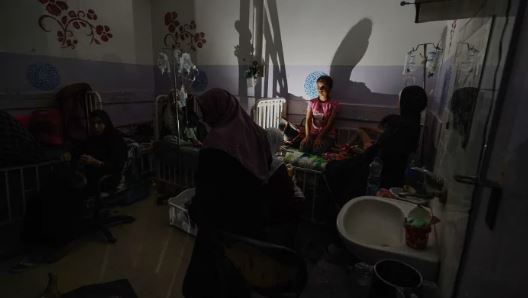In the dimly lit halls of Kamal Adwan Hospital in the northern Gaza Strip, mobile phone flashlights have become as vital as stethoscopes for doctors navigating without operational generators due to widespread fuel shortages.
The severe scarcity of fuel has compounded the difficulties faced by the already beleaguered healthcare system after more than 10 months of conflict.
The region’s sole power plant ceased operations early in the conflict, and the electricity supply has been cut off by Israel. Limited fuel and humanitarian aid continue to enter Gaza through Israeli-controlled checkpoints.
Ayman Zaqout, who struggled to reach the hospital in Beit Lahia due to ongoing Israeli strikes and evacuation orders, found himself receiving treatment in near-total darkness.
“There was no electricity, and I was concerned about how I would be treated under these conditions,” Zaqout said, wincing from pain caused by renal colic.
His experience highlights the critical state of healthcare facilities in Gaza, where Kamal Adwan Hospital was forced to stop accepting new patients shortly after his arrival due to the lack of fuel for generators.
Dr. Mahmoud Abu Amsha pointed out that international aid organizations have ceased supplying the necessary fuel, which could have dire consequences. “Children in incubators are at risk of cardiac arrest, and several patients in intensive care could die due to the fuel shortage,” he warned.
The ongoing conflict, which began with an unprecedented attack by Hamas on southern Israel on October 7, has resulted in substantial casualties. Israeli counterattacks have caused significant loss of life in Gaza, with over 40,000 Palestinians reported dead according to local health authorities.
While solar energy is used in emergencies, it cannot fully support patients requiring continuous electrical equipment.
The lack of fuel also hampers ambulance operations. Al-Awda Hospital, also located in northern Gaza, is awaiting a crucial fuel delivery to resume its generator operations.
Acting director Mohammed Salha noted that the hospital has had to reduce services and postpone surgeries, putting patients’ lives at risk. The hospital is currently maintaining minimal operations thanks to fuel donations from other facilities.
Gaza’s population of 2.4 million, nearly all of whom have been displaced at least once, now relies on just 16 partially functioning hospitals.










